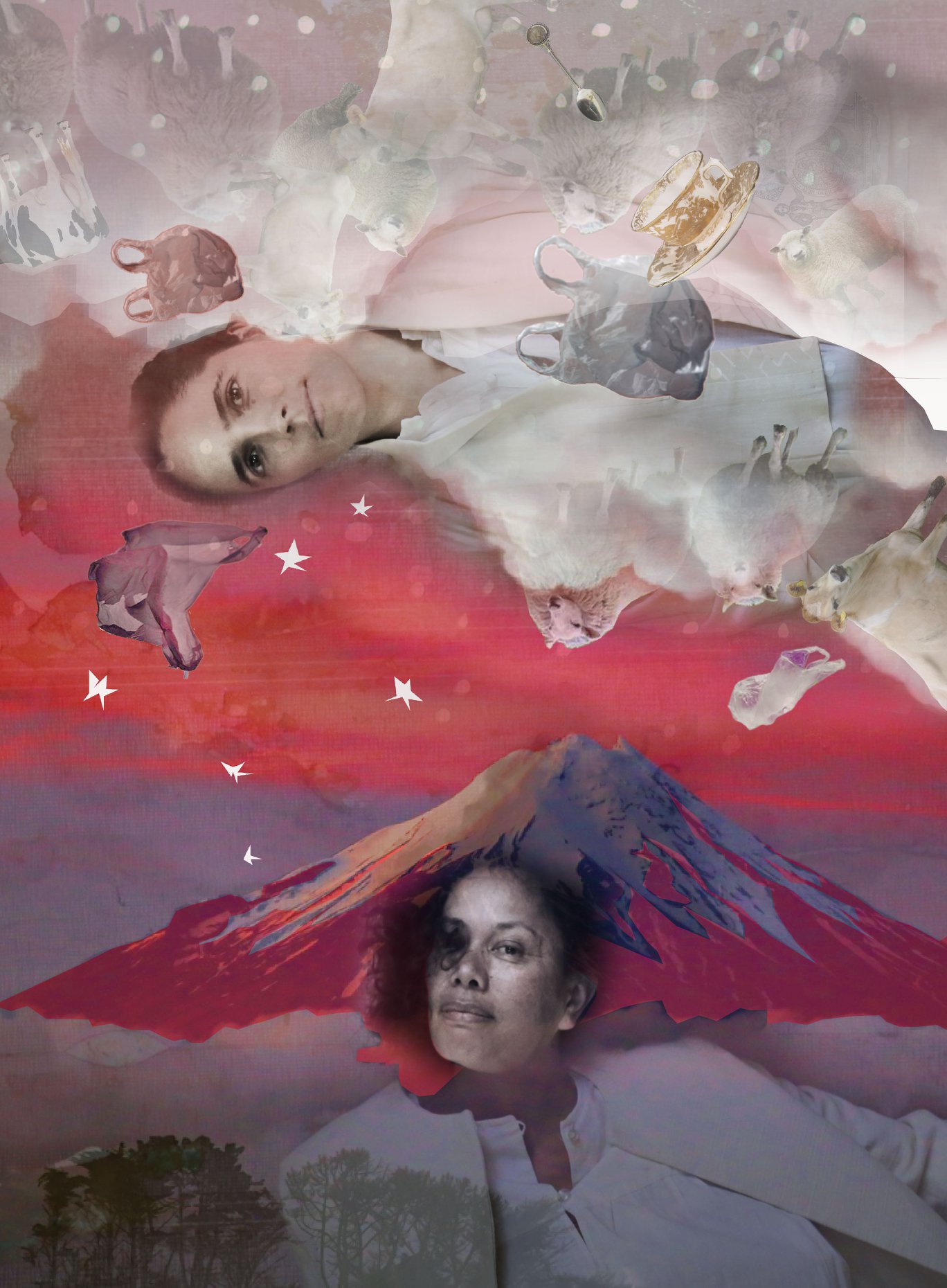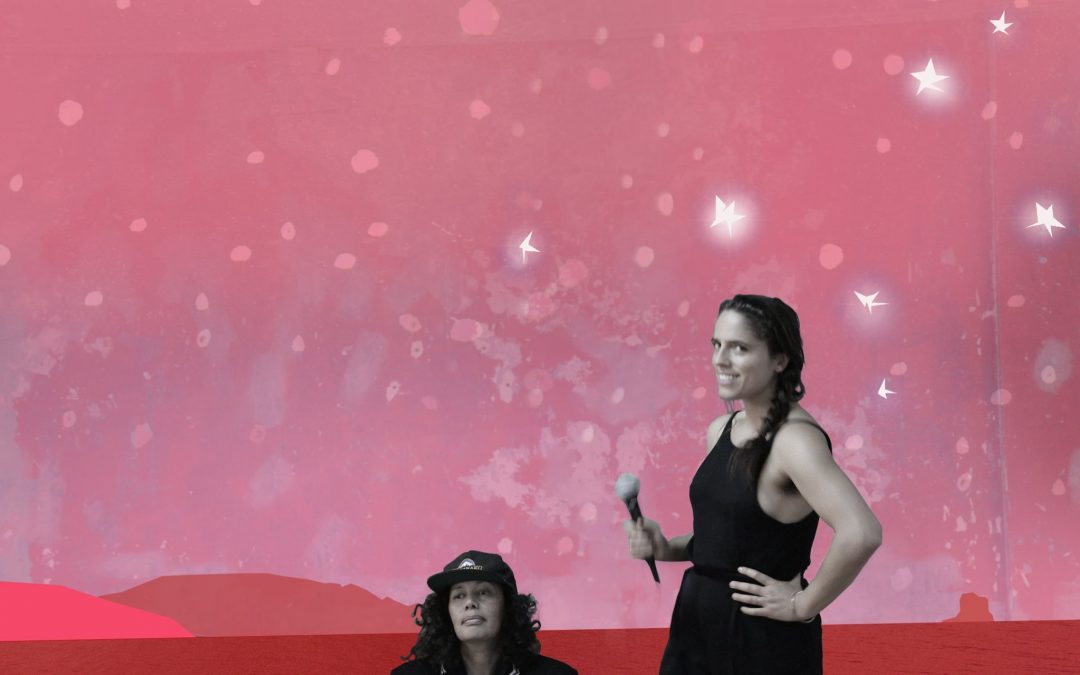My Big Fat Pākehā Pōwhiri: A Review of Inheritance
What do we inherit? How can we move forward from the violence of the past? Inheritance asks hard questions with surprising playfulness. New Volumes critic India Essuah reviews.
“I don’t know the words,” I hear the person next to me whisper nervously. During a scene in Inheritance, performers Jess Holly Bates (Pākehā) and Forest Kapo (Te Āti Awa, Ngāti Raukawa) turn the theatre’s opposing rows into a pōwhiri (almost). Everyone is swaying and singing along to ‘Te Aroha’. On reflection, hearing someone feel out of place in the middle of a pōwhiri (while contemplating how much swaying I was personally willing to partake in) was the exact kind of irony this show is looking to conjure. It encapsulates the multiple tensions and contradictions at play in well-meaning attempts to engage with Māori traditions: I think of the workplace where we sang waiata each week and welcomed overseas visitors with a hongi, yet this ‘engagement’ seemed conspicuously absent in more crucial areas, like their hiring practices. I also realise I know the words to this song from school – another place that strongly favoured theatrics and glossy, Eurocentric histories.
What do we do when our workplaces and institutions claim to embrace Māori values in their names, slogans, ceremonies, but continue to skirt tangible responsibility for decolonisation? What do we do with such criticisms, when they’re difficult to act on, or aren’t listened to? Inheritance doesn’t provide us with a roadmap or moralistic messaging. It does the much harder work of exploring what it means to keep asking better questions; to keep talking and, more importantly, listening to each other in closer and more constructive ways.
As well as demonstrating Bates’ and Kapo’s ability to quietly unsettle, the pōwhiri scene also shows their dexterity and humour, which they utilise to diffuse the tension they build, providing the audience with a sense of playful warmth and trust. Kapo then asks for song suggestions and sings a few tentative notes before launching into a rendition of Bob Marley’s ‘Buffalo Soldier’.
Through a series of eclectic vignettes, Inheritance draws on themes of inequality, privilege and colonisation, coming at them from all angles. Bates and Kapo work hard to find their personal similarities and build bridges across an ocean of difference and past offences. Inheritance sometimes moves gently, but Bates and Kapo are as equally capable of making the audience laugh and cry, even amid astute political commentary. The more heart-wrenching moments tend to fall toward the end of the show: at one point Bates provides an uncannily accurate Ardern impersonation, citing the Government’s “commitment to meeting its Treaty obligations” and, almost in the same breath, she’s suddenly leaning over Kapo assuring her she “just wants to check” her baby. Much of the audience gasps as on the third repetition of the phrase, the word ‘check’ suddenly changes to ‘take’ – the disturbing footage of an Oranga Tamariki uplift process fresh in our minds.
It’s a far cry from where the show began: with Kapo walloping the ground with kawakawa branches, before being wooed by Bates, mainly through a rendition of Justin Timberlake’s ‘My Love’. They dance to the song together after Bates helps Kapo into a matching pastel ‘Kate Sylvester’ tracksuit, a neat symbol of wealth, status and competition. The energy of the song’s idealistic lyrics carries them through a sketch where they lay out traits they think groups of us may share, and what they’ve inherited from their families (“protestant work ethic, visceral feminist anger”), searching for what they have in common with each other and the audience. They ask each other how much they spend on rent and expenses, before turning to question the audience to find out who has the highest student loan, the biggest mortgage, and who’s set to inherit the most houses. It never feels comfortable talking about wealth and debt. You can’t help but wonder why someone feels the need to add that “one property’s just a bach”, which figures remain unsaid, or how this exercise would play out differently for each night’s audience. Is it easier to talk about having a huge debt, or the fact your family owns five houses?
Bates and Kapo give up some control; as the audience, we form a part of the show, rather than being a passive group there to absorb what is put in front of us.
The audience’s seats consist of three rows facing each other, with Bates and Kapo traversing a narrow stage in between. This set design allows the conversational elements to flow freely. The lighting (designed by Anna Bennington) stays fully turned up for much of the show, so the other audience members are visible to both each other and the performers. This decision means that the space feels open and that Bates and Kapo give up some control; as the audience, we form a part of the show, rather than being a passive group there to absorb what is put in front of us.
Each scene is tightly packed with nuance, but with class and colonialism at its heart. Sometimes the metaphor is light – a pop tune standing in for the choreography of colonisation – but it weighs more heavily as the show’s references build on one another. Bates, Kapo and Inheritance co-creator Alyx Duncan often to leave us to make connections ourselves. When stark facts and re-told histories of genocide are layered between budget announcements and political speeches from the 90s and today, there’s enough space and ambiguity that it doesn’t feel as though we’re being forced to see it from one particular view. This apporach resembles the way life works off-stage: news stories, encounters and offhand comments don’t come with detailed comments or historical explanations at the ready.
Bates and Kapo also have a knack for conjuring a familiar scenario before turning it on its head in a way that unsettles, gently drawing comparisons and contrasts through quick shifts in tone. These frequent shifts are both refreshing yet disorienting; it’s hard to relax, as the lack of recognisable structure means we can never predict what will happen next. Even when Bates invites us to take deep breaths and settle into the space, the tone is satirical, reminiscent of a yoga teacher attempting to embody a borrowed (or appropriated) sense of spirituality that’s hard to fully believe.
Hearing the reality of land ownership framed in such blatant terms, explaining obvious elements that are often taken for granted, is as rare as it is satisfying.
A little later on, this dynamic is pushed even further as Kapo translates the hilariously mundane meaning of a speech Bates gives in Māori, using comedy to interrogate the weight we give to words when we don’t understand them. As in the pōwhiri scene, Bates speaks Māori, yet the content of her speech blurs the lines of who she is embodying, or what ‘side’ she represents, explaining the stolen land she’s standing on will remain in its current hands because “we have a stick and some prisons”. Hearing the reality of land ownership framed in such blatant terms, explaining obvious elements that are often taken for granted, is as rare as it is satisfying – I’m reminded of Jess Mio’s curation of the recent Five Pākehā Painters exhibition. Inheritance is brimming with interrogations of these ideas, showing us the many contradictions and injustices we live amongst, while never looking to simplify messy realities.
Inheritance is brimming with interrogations, showing us the many contradictions and injustices we live amongst, while never looking to simplify messy realities.
Bates again shifts a lived experience from the unsaid to the explicit in a scene where she acts as a child trying to impress her mum by reciting Wordsworth and shouting about how they can “take up space!” Kapo then guides us through “12 steps of being safely in a room with Pākehā”, suggesting each sentence is started with a smile, never to win competitions if at all possible, to remain seeming unsure of oneself at all times, and to avoid confronting racism at all costs. The juxtaposition of childish entitlement against an adult doing her best to shrink herself leaves us to ponder what our privilege allows us to learn, or our lack of privilege forces us to unlearn, to get by in the wider world.
Late in the show, Kapo changes from a tracksuit into a flowing, freeing red dress, performing a dance on her own, while Bates struggles to make heads or tails of her matching costume. These final scenes continue to explore what it means to reconcile, what it means to be comfortable, to feel respected, to thrive. Inheritance uses a range of forms to explore wealth, policy and status and bring history into sharp focus, making the absurdity of Aotearoa’s current inequalities impossible to ignore. There are no statistics, the word poverty isn’t mentioned, homelessness is only once, and there are none of the usual charged debates, no winners. There are just two people starting to untangle knotty problems, bringing us into the room to join them in asking: where we are to go from here? What are we going to pass on to our children and how does this affect what we share with each other? Inheritance offers new frameworks for looking to the future, without discarding the past.


